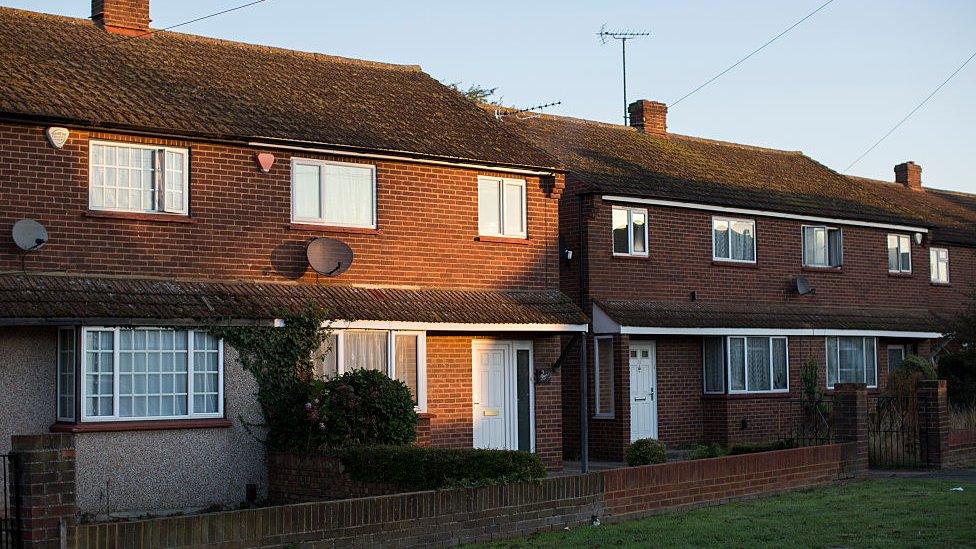Scots' wealth 'worth a trillion pounds'
- Published

Houses are increasing in value but pensions are an even bigger asset
The amount of wealth owned by Scots households has broken through the £1 trillion mark, following increases in property values and pension pots.
That's £1,000,000,000,000, or a million million pounds.
It is more than five times the value of the nation's economic output in one year.
But according to new research, household wealth is very unevenly spread. It is nearly twice as unequal as inequality in income levels.
The Resolution Foundation, a London-based economic analysis and think tank, has published a report showing that a quarter of Scots have savings of less than £500.
That is true of 22% of households across the UK.
It has called for the tax system to be used to re-allocate wealth, starting with reform of council tax.
The report, called The £1 Trillion Pie, argues for more focus on how wealth is spread, warning that there are big imbalances between regions of the country, and a growing problem of imbalances between generations.
Scottish households
Using figures from 2014 to 2016, the median Scottish household - with half the country more wealthy and one half less so - was found to have £237,000 in wealth.
That compares with £259,000 for Britain as a whole.
The big difference is in property wealth - a median of £65,000 in Scotland to £95,000 in Britain. This is skewed by high property prices in London and south-east England.
The Resolution Foundation estimate is of Scottish household property wealth totalling £285bn.

Some of the wealth is in the form of more eye-catching items such as yachts
By far the largest share of wealth - some £543bn - is in pension investments. The median Scottish household is thought to have £70,000 put aside in pensions, whereas the British figure is £58,000.
Financial wealth, including investment products such as shares and bonds, comes to £100bn in total, and is very unevenly spread.
Physical wealth is thought to total £122bn, including other assets people own, from cars and yachts to furniture and artwork.
Political debate
The report contends that there are several reasons why wealth, and the spread of wealth, should be a more important part of political debate.
Income Gap: It highlights the growth in wealth at a higher pace than the rise in incomes. That means it takes longer to earn and save money with which to become wealthy. In the past decade, Scottish wealth has grown from being five times bigger than total output of the economy (also known as income) to more than seven times.
Generation Gap: The generational divide on wealth is much greater than the divide on incomes. Taking every five year period since 1965, each successive cohort of Scots has had less wealth than their predecessors at the same age. That divide is clearest for those aged around 43. For those born in the five years up to 1975, at the age of 35 they had median wealth of £52,000. But for those born in the five years after 1975 (now aged 38 to 43), at the age of 35, they had median wealth of £33,000. One reason for this is the big dip in home ownership rates for people in that age group, though it has not dipped as far as Britain as a whole.
Legacy Gap: While older parents continue to build up wealth, much of it through property values and relatively generous pensions, wealth is transferred when they pass it on to their sons and daughters. "What you inherit, rather than what you earn, is set to become a much more important determinant of your lifetime living standards in the years ahead," according to Torsten Bell, director of the Resolution Foundation and co-researcher on The £1 Trillion Pie. He notes that revenue from inheritance tax paid in Scotland rose by 30% in the two years to 2014-15. A further twist is that those who stand to inherit wealth when their parents die are having to wait longer, because their parents are typically living longer. The peak age at which the average millennial, now aged 20 to 35, will outlive both parents is around 60.
Tax Gap: The report also notes that taxation on wealth has not kept pace with wealth, when counted as a share of national income. For the past 50 years or so, the payment of wealth-based taxes has amounted to around 2.5% of total economic output in any one year. Co-author Conor d'Arcy said: "While some wealth taxes are set in Westminster, including inheritance tax, the biggest wealth tax, Council Tax, is fully devolved. Recent modest reforms have improved council tax in Scotland, in marked contrast to the lack of progress in England, but the tax could still be much more closely tied to property values."
Regional Gap: Where wealth is held in property, those who do best and can pass on most to their family have benefited from living in areas where property prices have risen faster than average. The average value of a property in Edinburgh is more than £250,000. There are 11 council areas with average prices at less than half that.
Commenting on the overall findings of the study, Torsten Bell said: "Wealth in Scotland has grown fast in recent years and will come to play a bigger role in determining life chances in the decades to come.
"This increase in wealth across Scotland has sat alongside falling home ownership rates, particularly for young families, who are struggling to accumulate wealth as preceding generations have been able to.
"The accumulation, distribution and taxation of wealth should be at the centre of policy debates in Scotland in the years ahead. If current trends continue it will become much harder in modern Scotland to earn your way to being truly wealthy, and young people's prospects will depend less on their ability, and more on whether or not they inherit assets from relatives."
Responding to the study, Douglas Hamilton, chair of the Poverty and Inequality Commission, set up last year by the Scottish government, said: "The only thing more staggering than the level of private wealth that is held in Scotland, is the extremely high level of inequality that exists.
"Although the country as a whole has never been richer, the wealth is concentrated in a relatively small number of people, while 25% of the population have savings of less than £500.
"If there is any ambition in Scotland to address levels of poverty and inequality, it is clear that we will need to start looking at how we can ensure a more equitable distribution of wealth in our country."

What does it mean for Scotland's household wealth to have passed the £1 trillion mark?
Douglas Fraser, Business/Economy Editor, Scotland
Not much. It's just a way-marker, with an incomprehensibly large number attached. But it's a reminder that there is a lot more wealth in Scotland than is often assumed, much of it tied up in pension pots and property.
How much does it matter that it is unevenly spread? Much more than the total figure. It is another reminder that there are different inequalities, so fairness is not just about income. Lives and societies are also shaped by inequalities of education, opportunity, health and gender. Each can shape the other.
Wealth inequality has fallen, a lot. A hundred years ago, the top 1% owned 60% of British household wealth. Now, it's closer to 20%, having dipped slightly below that in the 1990s.
But the Resolution Foundation points to trends towards greater inequality in distribution of wealth which are certainly worth noting and, arguably, worth acting upon, with policy and tax measures.
Generation game
The most striking change in recent years has been generational. Low wage growth leaves less spare each month available for savings and investment. For many, it's hard or impossible to get on the housing ladder, so they are kept out of the most powerful generator of wealth. And if they hope their parents are going to leave them anything when they die, they're having to wait longer for it.
Some questions that arise: should there be incentives for parents to release more of their wealth to sons and daughters at an earlier stage?
That might require changes to council tax, encouraging high-wealth, low-income pensioners to move into smaller homes. It would require a housing strategy that makes more appropriate smaller homes readily available to them.
It might also require some form of insurance, through the state or the market, to pay the cost of long-term care. Only a minority need that, but many more hold on to assets for fear of the care bills.
Or should a more equal society mean reduction of inequality in wealth, and the opportunity that comes with it, by sharply raising inheritance tax, and closing loopholes around it? That's a political choice. It might meet a lot of resistance.
